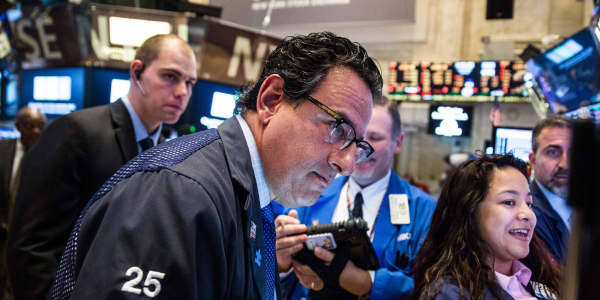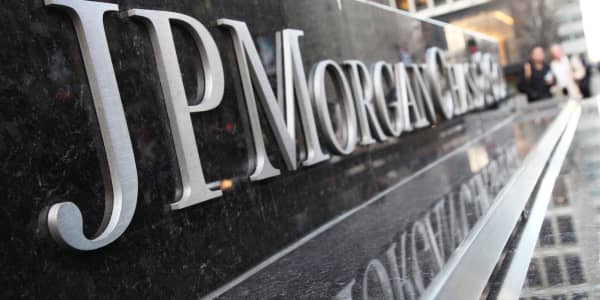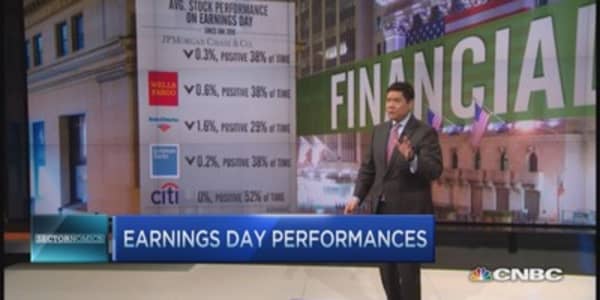Last week's disappointing jobs number could mean the Fed moves more slowly than expected with an interest-rate hike, but the quantitative easing trade has already moved, and beyond U.S. borders.
If you want to see where investors are betting on easy money policies from central banks to boost financial stocks, look no further than the relatively weak performance of U.S. bank stock exchange-traded funds in the first quarter as the yield curve flattened, and the outperformance of European and Japanese financials ETFs. The case for international financial stocks is a microcosm of the broader global equities bets focused on European and Asian stocks.
The domestic KBW bank stock index is down 2.17 percent year-to-date through April 6.
The KBW Global Financials Index (ex U.S.) is up 3.74 percent.
Fred Cannon, financial sector analyst at KBW, said the beating that U.S. bank stocks have taken recently is easy to explain. Investors had been betting since at least 2013 that an eventual Fed rate hike would increase the net interest margins of banks. Banks borrow short and lend long, and that makes the shape of the yield curve very important to banks. But the yield curve has flattened, against expectations, and that has diminished expectations for near-term net interest margin expansion.
"The flattening of the yield curve has killed U.S. banks," said Eric Dutram, ETF strategist at Zacks.
"U.S. banks had been strong outperformers relative to Europe, and now investors are looking for that trade in Europe, at least through 2015," Cannon said. U.S. bank stocks are up 10 percent in the past one-year period versus a negative return for the global financials, according to KBW data.
Speaking about both European and Japanese financials, he added that the more recent trade is "a play on asset and credit recovery in those markets and for those banks, and that has already played itself out in the U.S."
Q1 Financial ETF leaders
| Ticker | Name | YTD | 1YR |
| DXJF | WisdomTree Japan Hedged Financials | 10.41 | - |
| BDCS | ETRACS Wells Fargo Business Company ETN | 5.21 | -2.75 |
| PSP | PowerShares Global Listed Private Equity | 4.7 | -1.99 |
| EUFN | iShares MSCI Europe Financials | 4.31 | -6.98 |
| BIZD | Market Vectors BDC Income | 4.28 | -2.67 |
| PFI | PowerShares DWA Financial Momentum | 4.14 | 12.28 |
| KBWP | PowerShares KBW Property & Casualty Insurance | 3.09 | 19.31 |
| IPF | SPDR S&P International Financial | 2.9 | -0.76 |
| KBWD | PowerShares KBW High Dividend Yield Financial | 2.71 | 8.47 |
| CHIX | Global X China Financials | 2.55 | 34.12 |
| PEX | ProShares Global Listed Private Equity | 2.38 | -1.28 |
| KBWC | PowerShares KBW Capital Markets | 1.86 | 17.54 |
| FXO | First Trust Financials AlphaDEX | 1.66 | 9.77 |
Source: Source: ETF.com, Q1 2015 performance data. *Note: Japan Hedged Financials does not have a 1-year history
Among the best performers in the financials ETF space are hedged equity ETFs, and that's no surprise, as the hedge equity approach to ETF investing has been the biggest winner across all equities in 2015.
Dutram said the hedged equity trade, across the board, is a trade on the strength of the U.S. dollar more than on any individual sector—investors can target it through financials or any other kind of international equity. In choosing between Europe and Japan, Dutram thinks that the Japan trade has been extended for longer than the European opportunity.
"Europe's time is now," Dutram said. "If you really think Greece will run out of money, maybe Japan is the better pick, but the Japan story is a little played out," he added.
Going overseas in a big boat
The Zacks ETF strategist said he recommends making a broad bet on the hedged equity approach, such as the WisdomTree International Hedged Equity ETF (HEDJ), rather than a portfolio like WisdomTree Japan Hedged Financials (DXJF), even if it has been the best performer among financial ETFs so far this year. Dutram does think the international financials ETFs are a good place for investors to be looking right now, but he recommends broader bets. He noted that if you exclude the very volatile first few days of the first quarter, the iShares MSCI Europe Financials (EUFN) was up 10 percent in the first quarter. (The ETF was up 4 percent in Q1, including the really rough start.)
Read MoreGuess which country's energy sector is experiencing a huge rebound
Dutram is less inclined to recommend some of the most niche international financial plays, even ones that have done well, like the Global X China Financials ETF (CHIX). He said the China A shares trend in the ETF space is worth following, but with a broader China A shares ETF like iShares China Large-Cap (FXI) already offering 40 percent of its exposure to China through local financials, he doesn't think there is the need for a dedicated China financials portfolio.
"Everyone is focused on the A shares frenzy, but you get a decent enough financials component in a regular China ETF while still getting access to other sectors," Dutram said.
Cannon said investors overlook the opportunity in overseas financials at their own cost. "The global ones need to be watched carefully," he said, adding, "That could play itself out for a while. If QE succeeds in Europe and there is significant asset recovery, we could see financials continue to show strength."
The KBW analyst explained that "banks in Europe still have heavy credit costs baked into them because the economy hasn't been good, so if QE works and expands asset values, we can see earnings recover nicely."
U.S. financials sort of fell out of favor for a few months, and the funds are losing assets. ... We saw lots of interest in biotech, and it's been a strong performing segment, but if we see sector rotation, there could be a little more interest for regional bank and other U.S. rate plays.Eric DutramETF strategist at Zacks
The financials ETF space offers the second most choices of any sector bet behind technology ETFs, with more than 30 offerings, and some other bets are doing well also, though they don't tend to attract much in the way of assets from investors.
Several other financial stock niches are beating the broader equity market in 2015, according to performance data from KBW's family of financial stock indexes, some of which have ETF counterparts.
KBW financials indexes performance 2015
- KBW Mortgage Finance Index: 8.13 percent
- KBW Property & Casualty Index: 3.97 percent
- KBW Financial Sector Dividend Yield Index: 3.82 percent
- KBW Capital Markets Index: 1.55 percent
- KBW Regional Banking Index: 1.39 percent
- KBW Insurance Index: 0.37 percent
(Source: KBW, data through April 6)
Year-to-date, four of those six indexes beat the S&P 500 return of roughly 1.4 percent year-to-date (KBW Regional Banking is running neck-and-neck with the broader market while the insurance index has lagged because life insurance companies trade with long-term bonds due to the long-lived nature of their assets. When the 10-year is below 2 percent, the bond market will drag down life insurance stocks, which have large weightings in the insurance index.
Read MoreThese hot tech stocks are 'criminally underinvested'
Mortgage index has surprised this year because bond yields went down against expectations, and more than people expected. Coming into the year, people thought mortgage rates would be rising, putting a damper on refinancing activity.
Cannon said the Capital Markets Index—which includes all of the brokers—has done well, in part, because the beginning of the year has been volatile and the brokers and exchanges tend to outperform in these situations. There is such a thing as "good volatility," Cannon said, so short periods of the market moving up and down a lot are good for these firms, as long as it does not lead to investors bailing on the market entirely.
Dutram said that even though it's clear that "U.S. financials sort of fell out of favor for a few months and the funds are losing assets," once interest rates do rise, investors will take another look at the space. "We saw lots of interest in biotech, and it's been a strong performing segment, but if we see sector rotation, there could be a little more interest for regional bank and other U.S. rate plays," Dutram said.





